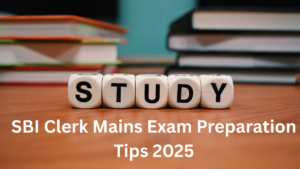Dear Aspirants,
Test your Professional Knowledge of HR with this questionnaire to prepare for IBPS HR Officer Examination. To score in IBPS SO (HR) Mains candidate must have adequate knowledge of Industrial Relations, Job Evaluation, Human Resource Planning, Labour Laws, Training and Development and more. This quiz covers important chapters of HR to help you prepare for the exam.
Q1. All of these statements are true except:
(a) Employee participation in pay level decision remains high given its impact on morale.
(b) Managers participate in both groups; those affected by policies and those who actually must implement policies.
(c) In addition to actual pay, the comparison standard influences employee attitudes.
(d) Managers play the most crucial communication role because of their day-to-day interactions with their employees.
(e) Mangers play the linking role in the oraginsation.
Q2. In relation to Quality circle, a statistical technique in decision-making used for the selection of a limited number of tasks that produce significant overall effect is-
(a) Exponential Smoothing
(b) Mean square weighted deviation
(c) Ishikawa cause and effect analysis
(d) Data Collection
(e) Pareto Analysis
Q3. Which of the following is/are correct regarding coordination?
(A) Coordination cannot be voluntarily produced by number of cooperating persons.
(B) Coordination is, for the most part, the result of voluntary attitudes on the part of people in an organization.
(C) Coordination is a far more inclusive term embracing the idea of cooperation.
(a) 1 and 2 only
(b) 1 and 3 only
(c) 2 only
(d) 1, 2 and 3
(e) 2 and 3 only
Q4. Section 41 G of the factories Act, 1948 says about
(a) Facing of Machineries
(b) Fencing of Machineries
(c) Workers participation in safety Management
(d) Work on near machinery in motion
(e) Spittoons
Q5. ……………….. is a company’s ability to perform in one or more ways that competitions cannot or will not match.
(a) Customer Advantage
(b) Customer life time value
(c) Customer Relationship Advantage
(d) Competitive Advantage
(e) Customer satisfaction
Q6. Which of the following can be termed as an Integration Function of Human Resource
Management?
(a) integration of goals with employee efforts
(b) Wage and Salary administration
(c) Bonus
(d) Non-financial incentives
(e) recruitment
Q7. TQM refers to –
(a) Total Quality Marketing
(b) Total Quantity Marketing
(c) Total Quality Management
(d) Total Quantity Management
(e) Total Quality Manager
Q8. Responding to employees and involving them in decision making is referred to as-
(a) Quality of work life
(b) Autonomy
(c) Empowerment
(d) Pre-action
(e) Dictatorship
Q9. Who among the following is known as the Father of Human Resource Management?
(a) Robert Owen
(b) Charles Babbage
(c) Frederick Taylor
(d) Kirk Gilbert
(e) Elton Mayo
Q10. According to whom, ‘Training is the act of increasing the knowledge and skill of an employee for doing a particular job”?
(a) Edwin Filippo
(b) Michael Julius
(c) Dennis Pennyworth
(d) Michael Armstrong
(e) Tim Williams
(a) Employee participation in pay level decision remains high given its impact on morale.
(b) Managers participate in both groups; those affected by policies and those who actually must implement policies.
(c) In addition to actual pay, the comparison standard influences employee attitudes.
(d) Managers play the most crucial communication role because of their day-to-day interactions with their employees.
(e) Mangers play the linking role in the oraginsation.
Q2. In relation to Quality circle, a statistical technique in decision-making used for the selection of a limited number of tasks that produce significant overall effect is-
(a) Exponential Smoothing
(b) Mean square weighted deviation
(c) Ishikawa cause and effect analysis
(d) Data Collection
(e) Pareto Analysis
Q3. Which of the following is/are correct regarding coordination?
(A) Coordination cannot be voluntarily produced by number of cooperating persons.
(B) Coordination is, for the most part, the result of voluntary attitudes on the part of people in an organization.
(C) Coordination is a far more inclusive term embracing the idea of cooperation.
(a) 1 and 2 only
(b) 1 and 3 only
(c) 2 only
(d) 1, 2 and 3
(e) 2 and 3 only
Q4. Section 41 G of the factories Act, 1948 says about
(a) Facing of Machineries
(b) Fencing of Machineries
(c) Workers participation in safety Management
(d) Work on near machinery in motion
(e) Spittoons
Q5. ……………….. is a company’s ability to perform in one or more ways that competitions cannot or will not match.
(a) Customer Advantage
(b) Customer life time value
(c) Customer Relationship Advantage
(d) Competitive Advantage
(e) Customer satisfaction
Q6. Which of the following can be termed as an Integration Function of Human Resource
Management?
(a) integration of goals with employee efforts
(b) Wage and Salary administration
(c) Bonus
(d) Non-financial incentives
(e) recruitment
Q7. TQM refers to –
(a) Total Quality Marketing
(b) Total Quantity Marketing
(c) Total Quality Management
(d) Total Quantity Management
(e) Total Quality Manager
Q8. Responding to employees and involving them in decision making is referred to as-
(a) Quality of work life
(b) Autonomy
(c) Empowerment
(d) Pre-action
(e) Dictatorship
Q9. Who among the following is known as the Father of Human Resource Management?
(a) Robert Owen
(b) Charles Babbage
(c) Frederick Taylor
(d) Kirk Gilbert
(e) Elton Mayo
Q10. According to whom, ‘Training is the act of increasing the knowledge and skill of an employee for doing a particular job”?
(a) Edwin Filippo
(b) Michael Julius
(c) Dennis Pennyworth
(d) Michael Armstrong
(e) Tim Williams





 GA Capsule for SBI Clerk Mains 2025, Dow...
GA Capsule for SBI Clerk Mains 2025, Dow...
 The Hindu Review October 2022: Download ...
The Hindu Review October 2022: Download ...
 SBI Clerk Mains Exam Preparation Tips 20...
SBI Clerk Mains Exam Preparation Tips 20...





